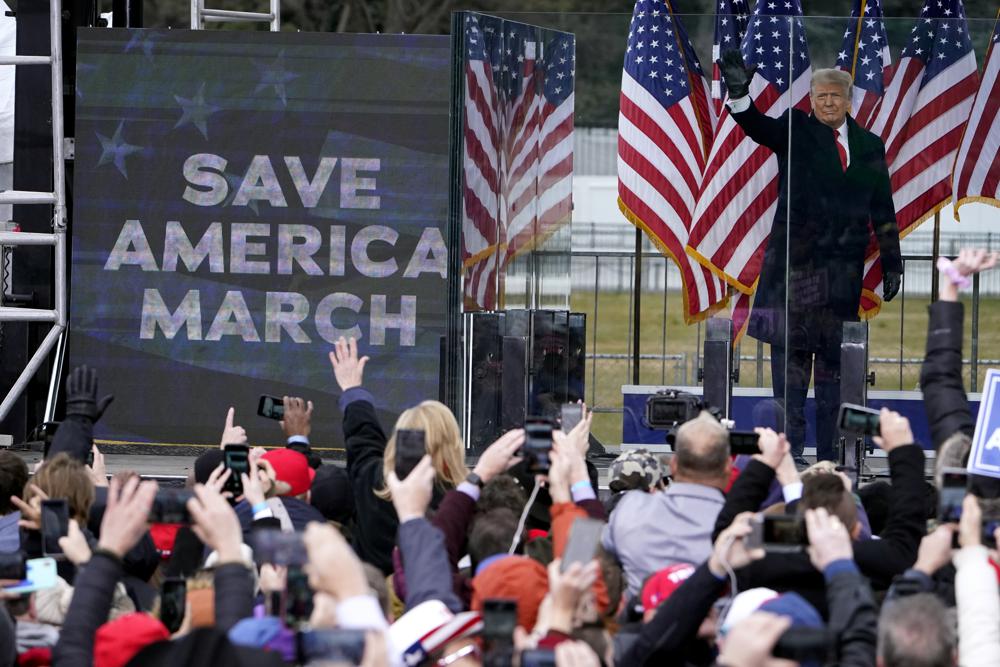Court temporarily delays release of Donald Trump’s January 6 records

A federal appeals court on Thursday temporarily blocked the release of White House records sought by a U.S. House committee investigating the Jan. 6 insurrection, granting — for now — a request from former President Donald Trump. The administrative injunction issued by the U.S. Court of Appeals for the District of Columbia Circuit effectively bars until the end of this month the release of records that were to be turned over Friday. The appeals court set oral arguments in the case for Nov. 30. The stay gives the court time to consider arguments in a momentous clash between the former president, whose supporters stormed the Capitol on Jan. 6, and President Joe Biden and Congress, who have pushed for a thorough investigation of the riot. It delays the House committee from reviewing records that lawmakers say could shed light on the events leading up to the insurrection and Trump’s efforts to delegitimize an election he lost. The National Archives, which holds the documents, says they include call logs, handwritten notes, and a draft executive order on “election integrity.” Biden waived executive privilege on the documents. Trump then went to court, arguing that as a former president, he still had the right to exert privilege over the records, and releasing them would damage the presidency in the future. U.S. District Judge Tanya Chutkan on Tuesday rejected those arguments, noting in part, “Presidents are not kings, and Plaintiff is not President.” She again denied an emergency motion by Trump on Wednesday. In their emergency filing to the appeals court, Trump’s lawyers wrote that without a stay, Trump would “suffer irreparable harm through the effective denial of a constitutional and statutory right to be fully heard on a serious disagreement between the former and incumbent President.” The Nov. 30 arguments will take place before three judges nominated by Democratic presidents: Patricia Millett and Robert Wilkins, nominated by former President Barack Obama, and Ketanji Brown Jackson, an appointee of Biden. Given the case’s magnitude, whichever side loses before the circuit court is likely to eventually appeal to the U.S. Supreme Court. The White House on Thursday also notified a lawyer for Mark Meadows, Trump’s former chief of staff, that Biden would waive any executive privilege that would prevent Meadows from cooperating with the committee, according to a letter obtained by The Associated Press. The committee has subpoenaed Meadows and more than two dozen other people as part of its investigation. His lawyer, George Terwilliger, issued a statement in response saying Meadows “remains under the instructions of former President Trump to respect longstanding principles of executive privilege.” “It now appears the courts will have to resolve this conflict,” Terwilliger said. The committee late Thursday threatened to begin contempt proceedings against Meadows if he doesn’t change course and comply. “Simply put, there is no valid legal basis for Mr. Meadows’s continued resistance to the Select Committee’s subpoena,” the committee wrote to Terwilliger, saying it would view Meadows’ failure to turn over documents or appear at a scheduled deposition on Friday as “willful non-compliance.” The House has already referred former Trump adviser Steve Bannon to the Justice Department for potential criminal prosecution for contempt of Congress. Republished with the permission of the Associated Press.
Donald Trump opponents try to beat him at the Electoral College

Grassroots campaigns have sprung up around the country to try to persuade members of the Electoral College to do something that has never been done in American history — deny the presidency to the clear Election Day winner. Activists are circulating online petitions and using social media in hopes of influencing Republican electors to cast their ballots for someone other than President-elect Donald Trump and deprive him of the 270 Electoral College votes needed to become the next occupant of the White House. “Yes, I think it’s a longshot, but I also think we’re living in strange times,” said Daniel Brezenoff, who created a petition in favor of Hillary Clinton and is asking signers to lobby electors by email or phone. “If it was ever plausible, it’s this year.” Trump has won 290 electoral votes to Clinton’s 232, with Michigan undecided, but Clinton is on pace to win the popular vote by at least 1 million ballots. Trump’s opponents are motivated by the outcome of the popular vote and by their contention that the businessman and reality TV star is unfit to serve as commander in chief. Just one elector so far has wavered publicly on supporting Trump. Texas Republican Art Sisneros says he has reservations about the president-elect, but not because of the national popular vote. He told The Associated Press he won’t vote for Clinton under any circumstance. “As a Christian, I came to the conclusion that Mr. Trump is not biblically qualified for that office,” he said. He said he has heard from ecstatic Clinton supporters and even supportive Republicans, but also from outraged Trump backers writing “threatening and vile things.” Sisneros signed a state party pledge to support the GOP’s standard-bearer, but that was before Trump was the official nominee. He said one of his options is to resign, allowing the state party to choose another elector. Electors are chosen by party officials and are typically the party’s most loyal members. Presidential electors are not required to vote for a particular candidate under the Constitution. Even so, the National Archives says more than 99 percent of electors have voted as pledged throughout the nation’s history. Some state laws call for fines against “faithless electors,” while others open them to possible felony charges, although the National Archives says no elector has ever been prosecuted for failing to vote as pledged. In North Carolina, a faithless elector’s vote is canceled, and he or she must immediately resign and be replaced. Layne Bangerter and Melinda Smyser, two of Idaho’s four Republican electors, said they have been flooded with emails, telephone calls and Facebook messages from strangers urging them to reconsider their vote. “It’s just not going to work,” Bangerter said. “I hope it dies down, but I don’t see that happening.” The volume and tone of the messages caught the attention of Idaho’s secretary of state, who urged the public to remain civil as electors prepare to cast their ballots on Dec. 19 while meeting in their states. Republican Party officials in Georgia and Michigan said their electors also have been bombarded with messages, and Iowa reported increased public interest in obtaining contact information for electors. Michael Banerian, 22, one of Michigan’s 16 Republican electors, said he has received death threats from people who do not want him to vote for Trump. But he said he is undeterred. “It’s mostly just a lot of angry people who don’t completely understand how the process works,” said Banerian, a political science major at Oakland University. P. Bret Chiafalo, a Democratic elector in Washington state, said he and a small group of other electors from the party are working to contact their Republican counterparts and ask them to vote for any GOP candidate besides Trump, preferably Mitt Romney or John Kasich. Under the Constitution, the House — currently under Republican control — decides the presidency if no candidate reaches the required electoral vote majority. House members choose from the top three contenders. This isn’t the first time electors have faced pressure to undo the results of Election Day. Carole Jean Jordan, a GOP elector from Florida in 2000, recalled the “unbelievably ugly” aftermath of the recount battle between George W. Bush and then-vice president Al Gore, a dispute that ended with the U.S. Supreme Court leaving Bush’s slim margin intact and handing him the presidency. Jordan said Florida’s electors were inundated with nasty letters from people saying they should not vote for Bush. Police kept watch over her home until the electors convened in Tallahassee to cast their votes. They stayed at the same hotel, guarded by security officers who also escorted them to cast their ballots at the state Capitol. Republished with permission of the Associated Press.


